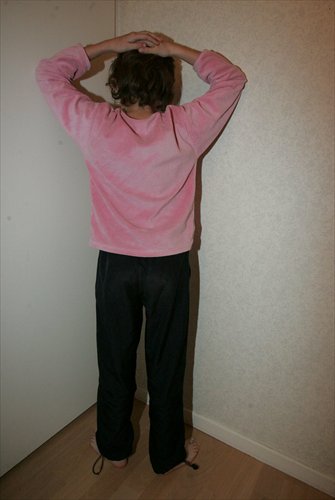HOME >> METRO BEIJING, LIFE
Spanks for nothing
By Lin Kan Hsuan Source:Global Times Published: 2014-5-25 18:43:01

Corporal punishment is an instinctive reaction for many parents whose children misbehave, but experts insist there are more effective methods of discipline. Photo: CFP
Lin Binghuang loves his son Leilei dearly, and would be furious if a teacher or another adult laid a hand on the rambunctious 4-year-old.But Lin isn't shy about giving Leilei a smack when he crosses the line by putting his own safety at risk.
"When Leilei tried to use my razor to imitate me shaving, I was astonished and afraid that he would hurt himself," Lin recalled. "I grabbed the razor and warned him about the danger. However, he was still very curious about it."
Lin, 44, couldn't help but imagine the bloody outcome if Leilei really used the razor and cut himself. He decided to put the razor on the top of the cabinet, and then slapped his son's palm lightly to let him know he had misbehaved.
"He is kind of hyperactive, but not at the level of seeing the doctor," said Lin. "He not only plays with my razor, but also tries to approach the stove when his mother cooks."
Leilei's worried parents often use corporal punishment to teach him a lesson, including forcing the boy to kneel and lightly smacking his buttocks. However, they also tell their son the reason why he is being punished in a bid to correct his behavior.
Lin's wife lost her temper when Leilei inserted a metal key into a power outlet.
"She caught him in time, thank heavens," Lin said. "She slapped him without thinking too much. Afterwards she apologized. Both of us know that we can't afford any possible accidents, so we use an educational method strongly disapproved of by most of parents."
Lin's actions resonate with many other concerned parents who want to ensure their children stay safe. However, experts suggest that there are more effective ways to discipline children that don't carry the same long-term risks as corporal punishment.
Yang Changyi, a consultant from New Life Path, a psychological training institution based in Guangzhou, Guangdong Province, warned giving a child a smack can do more harm than good.
"I oppose any form of physical punishment. There are always better ways to educate children," Yang said.
Asked about Leilei's case, Yang offered a bold suggestion for any parent whose child wants to touch a hot stove: let them. A parent can stand beside the child and allow them to put their hand close to the flame to find out why it's a bad idea, said Yang.
"Kids are clever enough to detect danger when feeling a rising temperature near their hand," he said. "Don't try to repress their desire to discover the world. Telling them something is dangerous will only make them more excited."
Christine Dang, president of a private kindergarten in Chaoyang district, is another staunch opponent of corporal punishment. Based on her eight years' experience in early childhood education, Dang said most children aren't aware that their harmful behavior bothers their peers or family members.
"Sometimes children will bully each other," she explained. "First of all, the teachers have the obligation to figure out their motivation."
Some children imitate their family members' violent behavior, which might include meting out corporal punishment. However, others consider physicality the only way to express their dissatisfaction because they don't have more advanced communication skills.
Physical discomfort is temporary, but Yang warned that hitting a child can have long-term mental repercussions.
Posted in: Metro Beijing, Family